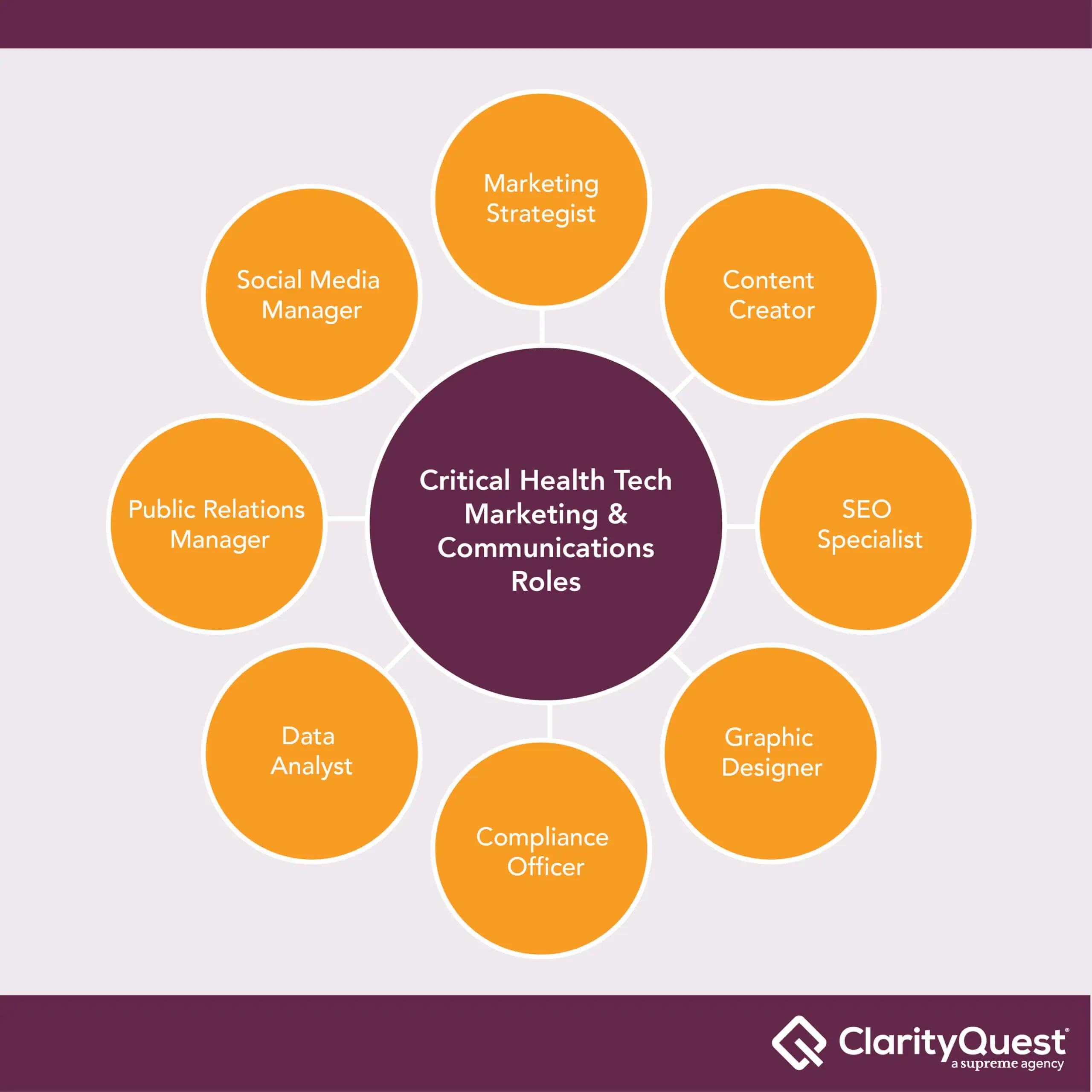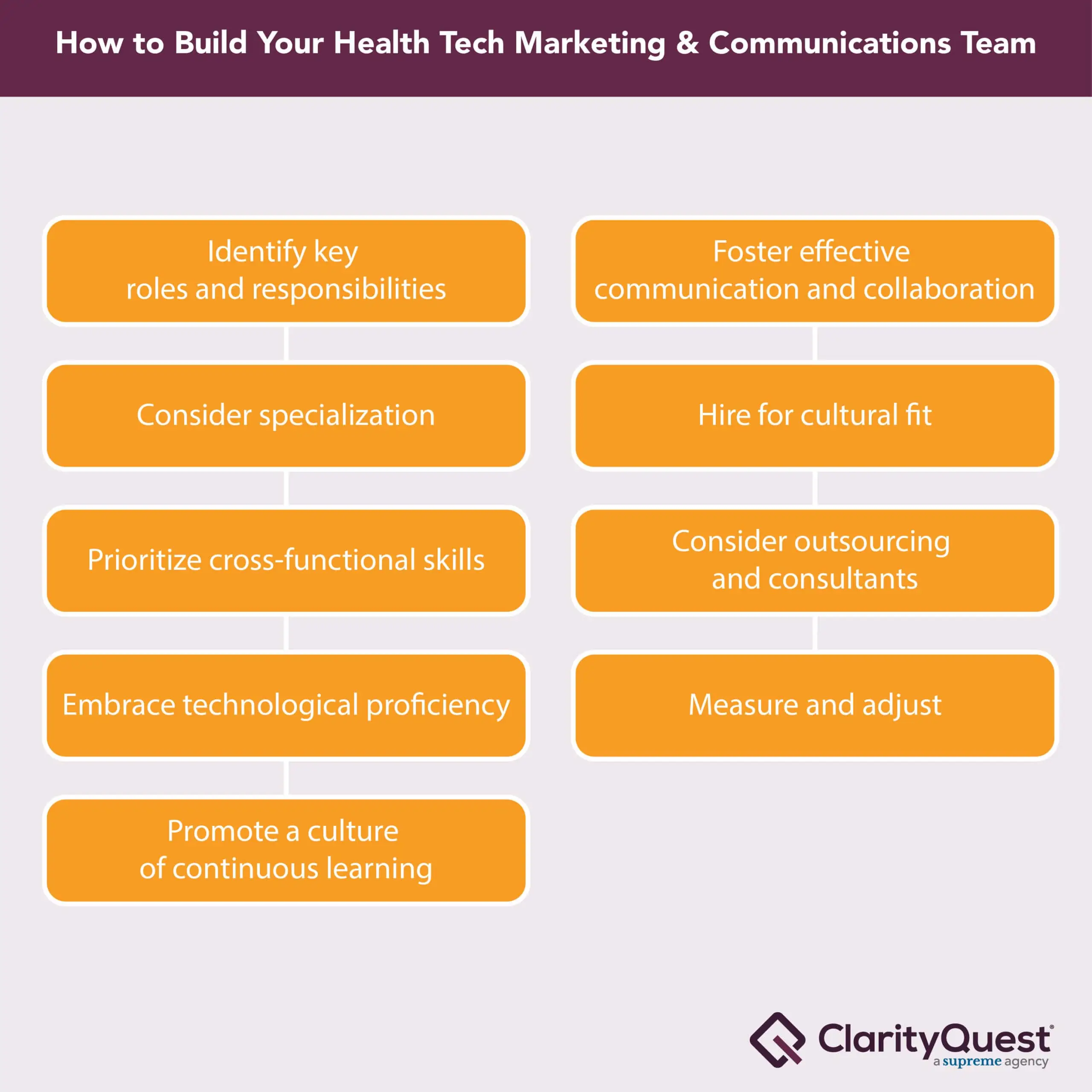Marketing and communications department structure and strategy are vital considerations for B2B healthcare technology companies. They ensure effective communication with healthcare professionals and patients, promoting trust and understanding.
Additionally, a thoughtful approach to team development enables healthcare technology companies to navigate the complex regulatory environment and effectively differentiate their products in a competitive market, ultimately driving adoption and success.
Discover why a well-built and skilled healthcare technology marketing and communications department is essential to thrive in this competitive environment and learn how to build one.
Identify key roles and responsibilities
Before determining your marketing and communications department structure, it’s vital to identify the key contributors required to meet your organization’s goals. These typically include the following, depending on company size, complexity, and goals.
Marketing Strategist
Responsible for developing and executing marketing strategies tailored to the digital health industry, including brand positioning, customer segmentation, and marketing campaigns.
Content Creator
This role focuses on creating compelling and informative content such as blog posts, whitepapers, videos, and infographics that resonate with your target audience.
Social Media Manager
Manages social media platforms, engages with the online community, and develops social media marketing campaigns to increase brand visibility.
SEO Specialist
Optimizes website content and online assets to improve search engine rankings, increasing organic traffic and visibility.
Public Relations Manager
Manages media relations, press releases, and crisis communication strategies, ensuring your brand maintains a positive image.
Graphic Designer
Creates visually appealing assets, including logos, images, and graphics for marketing materials.
Data Analyst
Analyzes marketing data and KPIs to measure the effectiveness of campaigns and make data-driven decisions.
Compliance Officer
Ensures all marketing and communication activities adhere to healthcare regulations and guidelines.
Consider specialization
In the health tech sector, specialization can be advantageous. Healthcare is complex, and understanding its nuances can set your team apart. Consider hiring professionals with experience in healthcare marketing, as they are familiar with industry-specific challenges and regulations. Specialization can also enhance your credibility and trustworthiness among healthcare professionals and patients.
Prioritize cross-functional skills
While specialized knowledge is essential, cross-functional skills are also crucial in a healthcare technology marketing and communications department. Encourage team members to collaborate and develop a broad skill set that includes project management, data analysis, and communication skills. A well-rounded team can adapt more effectively to the constantly evolving healthcare landscape.
Embrace technological proficiency
Given the digital nature of the healthcare industry, proficiency with marketing and communication tools and platforms is essential. Ensure your team is well-versed in marketing automation software, analytics tools, content management systems, and healthcare-specific software and applications. Staying up-to-date with technological advancements is key to staying competitive.
Promote a culture of continuous learning
The health tech industry continuously evolves, with new regulations, technologies, and trends emerging regularly. Encourage your team to engage in continuous learning and professional development. Consider providing opportunities for training, attending conferences, and staying informed about industry updates. A culture of learning ensures your department remains agile and adaptable.
Foster effective communication and collaboration
Successful healthcare technology marketing and communication efforts require seamless collaboration between various team members and departments. Establish clear lines of communication and collaboration processes to ensure everyone is aligned with the organization’s goals. Regular meetings, brainstorming sessions, and feedback loops can promote teamwork and creativity.
Hire for cultural fit
Cultural fit is as important as skills and experience when hiring for your healthcare technology marketing and communications department. Healthcare is a field where ethics and integrity are paramount. Look for team members who share your organization’s values, ethics, and commitment to patient care. A cohesive team with shared values will more likely represent your brand effectively.
Consider outsourcing and consultants
In some cases, outsourcing or hiring consultants can be a cost-effective and strategic choice. Specialized agencies and consultants can provide expertise and resources that your in-house team may lack. They can help execute specific projects or campaigns, especially if they require niche skills or knowledge.
Measure and adjust
Once your healthcare technology marketing and communications department is up and running, it’s crucial to continually measure its performance and adjust your staffing strategy as needed. Use key performance indicators (KPIs) to evaluate the effectiveness of your marketing campaigns and communication efforts. If certain roles or skills gaps become evident, be prepared to make changes to optimize your team’s performance.
Give marketing and communications their due attention
Building a successful healthcare technology marketing and communications department structure requires careful planning and consideration of the unique demands of the industry. And that’s to say nothing of the rigorous searching you will need to conduct to find the best fits.
Remember that the health tech landscape continues to evolve rapidly, and your staffing strategy should adapt accordingly to stay competitive and relevant.




